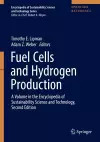
Fuel Cells and Hydrogen Production
2 contributors - Set / collection
£749.99
Timothy E. Lipman is an energy and environmental technology, economics, and policy researcher and lecturer with the University of California - Berkeley. He is serving as Co-Director for the campus' Transportation Sustainability Research Center (TSRC), based at the Institute of Transportation Studies, and also as Director of the Northern California Center for Alternative Transportation Fuels and Advanced Vehicle Technologies (NorthCAT -- see "northcat.org") effort. Tim's research focuses on electric-drive vehicles, fuel cell technology, combined heat and power systems, biofuels, renewable energy, and electricity and hydrogen energy systems infrastructure.
Lipman received his Ph.D. degree in Environmental Policy Analysis with the Graduate Group in Ecology at UC Davis (1999). He also has received an M.S. degree in the technology track of the Graduate Group in Transportation Technology and Policy, also at UC Davis (1998), and a B.A. from Stanford University (1990). His Ph.D. dissertation titled "Zero-Emission Vehicle Scenario Cost Analysis Using A Fuzzy Set-Based Framework" received the University of California Transportation Center's 'Charlie Wootan' Ph.D. dissertation award for 1999. He is also a 2005 Climate Change Fellow with the Woods Institute at Stanford University, and he also received a 2004 Institute of Transportation Engineers service award, a 1998 NSF IGERT teaching fellowship, a 1997 University of California Transportation Center Dissertation Grant, a 1996 ENO Foundation Fellowship, a 1995 University of California Transportation Center Dissertation Grant, and a 1994 Chevron Foundation Fellowship. A native of Golden, Colorado, he graduated Cum Laude from Colorado Academy in 1986.
Most of his research projects are related to the transformation of energy systems to support motor vehicles and buildings, examining how both incremental and "leap frog" technologies can be applied to reduce greenhouse gas emissions and other negative environmental and social impacts of energy use. A central concept for his research is that the electrification of the transportation sector can realize synergy with a concentrated effort to reduce the carbon intensity of the electrical grid, yielding benefit for the electricity sector as well as the expanded use of electricity, hydrogen, and biofuels.
Adam Z. Weber holds B.S. and M.S. degrees from Tufts University, the latterunder the guidance of Professor Maria Flytzani-Stephanopoulos. Next, heearned his Ph.D. at University of California, Berkeley, in Chemical Engineeringunder the guidance of John Newman. His dissertation work focused on thefundamental investigation and mathematical modeling of water managementin polymer-electrolyte fuel cells.Dr. Weber continued his study of water and thermal management inpolymer-electrolyte fuel cells at Lawrence Berkeley National Laboratory,where he is now a staff scientist and program manager for Hydrogen andFuel Cell Technologies. His current research involves understanding andoptimizing fuel-cell performance and lifetime including component andionomer structure/function studies using advanced modeling and diagnostics,understanding flow batteries for grid-scale energy storage, and analysis ofsolar-fuel generators where he is a Thrust coordinator at the Joint Center forArtificial Photosynthesis (JCAP).Dr. Weber has coauthored over 110 peer-reviewed articles and 10 bookchapters on fuel cells, flow batteries, and related electrochemical devices;developed many widely used models for fuel cells and their components;and has been invited to present his work at various international and nationalmeetings. He is the recipient of a number of awards including a Fulbrightscholarship to Australia, the 2008 Oronzio and Niccolò De Nora FoundationPrize on Applied Electrochemistry of the International Society of Electrochemistry,the 2012 Supramaniam Srinivasan Young Investigator Award of theEnergy Technology Division of the Electrochemical Society, a 2012 PresidentialEarly Career Award for Scientists and Engineers (PECASE), the 2014CharlesW. Tobias Young Investigator Award of the Electrochemical Society, aKavli Fellow in 2014, and the 2016 Sir William Grove Award from theInternational Association for Hydrogen Energy. He is a Fellow of The ElectrochemicalSociety.